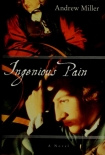Ingenious pain by Andrew Miller (best young adult book series txt) 📗

- Author: Andrew Miller
Book online «Ingenious pain by Andrew Miller (best young adult book series txt) 📗». Author Andrew Miller
Negro's belly. Then John Amazement pivots, adds his own force to Hawkins's drive, and flips him over, lightly and neatly as if the farmer were a boy of Sam's age. Hawkins lies a moment on his back, winded, then gets to his feet, the dirt stuck on to the sweat of his back. He shakes his head, grins and takes his shirt and waistcoat from the woman.
The woman issues a second challenge. Who can beat the Moor?' John Amazement is standing quietly behind her, massaging his left shoulder. Suddenly he staggers backward, bawls, snatches at nothing and collapses, the ground shivering under his weight. The quickness of it stuns them. They stare at the great outstretched body, its weird stillness; the woman walks towards him slowly. She calls his name. There is no response. Dido whispers: 'What is it? What has happened?'
James's strongest instinct is to leave; to walk quickly away, with or without Dido. He knows that if he does not go now, this very instant, it will be too late, but the now passes and he has not moved. The woman is kneeling by the Negro's head. She is calling for someone to help him. She is begging.
James steps into the shade of the booth; heads turn to stare at him. He hears his name. He does not look anywhere other than at the Negro and the woman. When she sees him coming she stops crying out. His presence seems to calm her. She holds up her arms to him, blabs something he cannot understand, is not listening to. He is looking down at John Amazement. It is no more than half a minute since the attack but already he seems long dead. James kneels. He wants to say to her: 'He's dead,' but he cannot; he cannot stand the thought of her grief He puts his hand lightly on the Negro's chest. The skin is clammy but he feels a warmth at the heart. He has felt this before; it lasts some minutes after the patient has ceased to breathe, after the heart has stopped. He remembers an evening in Bath, a young woman at a dance dropping down as suddenly as this. They had been dancing the
hornpipe. He was there with Agnes Munro, and he had stooped over the girl, guessing it was her heart. For a moment then, he had considered something wild: attempting to resuscitate her by opening her chest. It had come to him quite spontaneously, and the thought had excited him, yet he did not have his bag to hand, and the sight of him cutting open a young woman in a ballroom was unlikely to have enhanced his reputation. Now he has no reputation. He looks at his hands. They are steady, steady enough. He reaches into his coat pocket and takes out his clasp-knife. George Pace sharpened it on the whestone the other day while he was doing one of the scythes. It has a good edge on it now. Pace said: Tou could bone a fish wi' that. Doctor.'
James looks at the woman, manages a smile, a grimace. She sees the knife in his hand. Trust me,' he says, speaking to himself as much as to her. 'Trust me.' She nods. Perhaps she understands. She looks away. He has Grimaldi's watch in his pocket but no one shall time him today. He presses the point of the knife against John Amazement's breastbone, then eases his grip on the wooden handle. He knows how hard it is to cut into human beings, how stubborn the flesh can be with its knots and grains; but the knife must not be held as a child holds a pen. It must float in his hand, Hke the brush of an artist.
He cuts, unaware of the sighs of horror, of disbelief, from the watchers all around him; unaware of the heat of the booth, the pain in his leg as he kneels. He opens the chest, cuts the costal cartilage of the ribs, sites the heart inside the fibrous glove of the pericardium, half hidden behind the sac of the left lung; feels for it, grasps it, squeezes. For a single minute he has regained his former purity of attention. This is the target to which the arrow of his life has been flighted. In this act, all his experience unites. It is the true and unlooked-for harvest.
His hand mimes the rhythms of the heart. Life bobs to the surface of the Negro's eyes. The dead man lives, gasping, sputtering, as though he has been under water and has come suddenly, fiercely into the air again. He speaks, a voice retrieved from silence, from death. He gasps, then speaks, soft and clear, a half-dozen words that sound to James like words inverted, mirror words, the language of the dead, a sentence smuggled back in the mouth. The woman looks at James. There is dust on her face which has adhered to the path of her tears. She says: 'That's 'is own lingo. That's Africa.'
In time he grows a great grey scar across his chest and changes his name. He does not wrestle any more. He lives. It is the surgeon, whose name the Negro forgets, but whose face floats in his sleep all the years of his life like the moon on water, who was a friend of the parson and his sister, and who had been, some said, truly or otherwise, as far as Russia and met the Empress and had adventures; a neat, sad, limping, clever sort of man; it is he who does not live out the summer, dying on an August morning in a field of summer barley near the village, his sketchbook on his lap;





Comments (0)